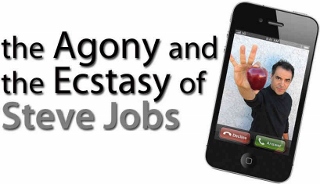THE THEATER TAKES ON CORPORATE AMERICA’S EVILS
After a flurry of controversy in 2012, Mike Daisey’s provocative activism-cum-monologue work, The Agony and the Ecstasy of Steve Jobs, is playing at Theatre Asylum. This factual account is testimony of the tragic human exploitation that 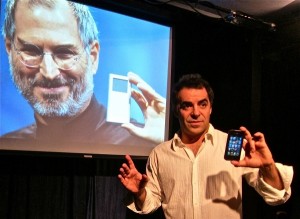 occurs at the Foxconn factory in Shengzhen, China, the world’s biggest manufacturer of Apple products (and 50% of all electronic products worldwide). Daisey’s story, set in China’s massive industrial zone, is marked by mind-blowing accounts given by the individual Foxconn workers that assemble iPods, iPads, and iPhones by hand. Mimicking the clean-cut TED Talk lecture style, Alex Lyras (locally loved for his critically-lauded The Common Air) performs his own rendering of this theatrical exposé, which is both a loving geekdom homage to the history of computing technology and a chilling portrait of the very real human cost of globalization.
occurs at the Foxconn factory in Shengzhen, China, the world’s biggest manufacturer of Apple products (and 50% of all electronic products worldwide). Daisey’s story, set in China’s massive industrial zone, is marked by mind-blowing accounts given by the individual Foxconn workers that assemble iPods, iPads, and iPhones by hand. Mimicking the clean-cut TED Talk lecture style, Alex Lyras (locally loved for his critically-lauded The Common Air) performs his own rendering of this theatrical exposé, which is both a loving geekdom homage to the history of computing technology and a chilling portrait of the very real human cost of globalization.
Although short, the history of Agony is surrounded by a fascinating mess of scandal: During the play’s run with New York’s Public Theatre in 2012, Daisey was featured on Episode 454 of the National Public Radio (NPR) program, This American Life 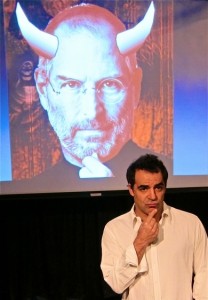 with Ira Glass. Sweetly entitled “Mr. Daisey and the Apple Factory,” the show aired on January 6. Daisey discussed his play and the human rights ugliness that he witnessed at Foxconn. The program received tremendous public attention and went off without a hitch… that is until a researcher discovered that a small portion of Daisey’s narrative was not as accurate as the playwright professed.
with Ira Glass. Sweetly entitled “Mr. Daisey and the Apple Factory,” the show aired on January 6. Daisey discussed his play and the human rights ugliness that he witnessed at Foxconn. The program received tremendous public attention and went off without a hitch… that is until a researcher discovered that a small portion of Daisey’s narrative was not as accurate as the playwright professed.
Glass responded with outrage. He ostracized Daisey for not upholding journalistic ethics (seemingly oblivious to the fact that Daisey is a playwright, not a journalist) and retracted “Mr. Daisey and the Apple Factory” in a hugely popular March 2012 episode of This American Life simply called “Retraction.” To this day, the program remains the only retraction that Glass has ever issued and is the most listened-to and downloaded episode of This American Life. The theater community can surely only speculate as to Glass’s motives in attacking Daisey.
Since then, Daisey has reworked his now-iconic work, altering the disputed content for unquestionable accuracy. Audiences can expect to learn about Orwellian industrialization at its stream-lined worst through the faces of those that live with it each and every day. Suicide nets, 12-hour silent shifts, child labor, secret unions, and debilitating occupational hazards are pitted against glossy lab-coat efficiency, 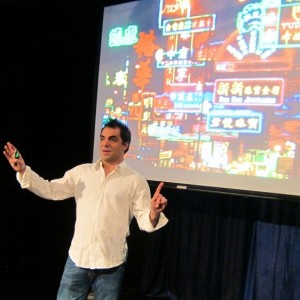 cut-throat profit margins, and brilliant aesthetic design. Those familiar with both the old and new versions of the play know that the new script tweaks are minor. Content aside, Daisey’s work is often poignant, poetic, and touching – the product of a man who has been unfortunate enough to see the deep flaws of his idol.
cut-throat profit margins, and brilliant aesthetic design. Those familiar with both the old and new versions of the play know that the new script tweaks are minor. Content aside, Daisey’s work is often poignant, poetic, and touching – the product of a man who has been unfortunate enough to see the deep flaws of his idol.
Lyras, a seasoned solo actor and writer, performs his own pared down take on Agony, which he has succinctly trimmed for hard-hitting emotional engagement. He delivers the tech-centric globalization monologue with endearing empathy for those victimized by the complexities of cheap commodity production and an obvious fondness for Daisey’s craft. Without sacrificing theatricality, Lyras educates his audience, easing through the play with masterful timing, bright enthusiasm, and deep compassion.
It is perhaps difficult to tell where the work of Lyras ends and that of director Robert McCaskill’s begins for this production, but the performance is orchestrated with fluid precision and carefully calculated blocking. The set of Agony is very simple, 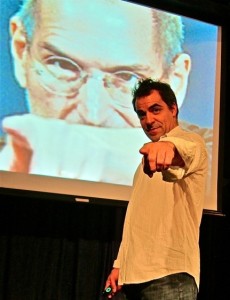 but yields to a nicely integrated presentation of historical computing artifacts and Foxconn factory images, inherently matched to the context of the play.
but yields to a nicely integrated presentation of historical computing artifacts and Foxconn factory images, inherently matched to the context of the play.
Agony is unique. It is a play with a higher purpose beyond entertainment, one that seeks to empower and enlighten a global community unknowingly linked by pocket-sized gadgets. The play has quite literally reached and angered enough ethically moved Apple customers to trigger top-down change at Foxconn. While the change is small at the moment, it is indeed happening and ever-increasing. To think that a little stage play could successfully take on the biggest, wealthiest company in the entire world is pretty bad ass in this reviewer’s book and certainly worth the price of admission.
photos by Christina Xenos
The Agony and the Ecstasy of Steve Jobs
Combined Artform at Theatre Asylum in Hollywood
scheduled to end on April 10, 2013EXTENDED to June 5, 2013
for tickets, call 800-838-3006 or visit Brown Paper Tickets
